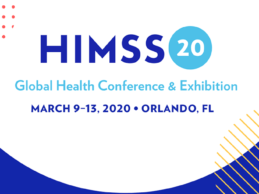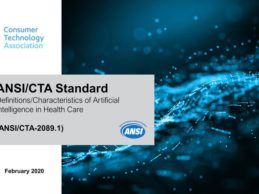The coronavirus pandemic has affected every aspect of our lives, from how we work to how we get our health care. The crisis has put the creativity of many small businesses to the test after being forced to move operations online once social distancing became the norm. As economies reopen, many aspects of our life that changed in response to the virus will likely return to the way they were.
However, we have the opportunity to emerge stronger from this crisis if the salient shortcomings from
Read More
AI in healthcare
GYANT Raises $13.6M for AI-Enabled Digital Front Door Solution to Drive Patient-Doctor Engagement
What You Should Know:
- GYANT raises $13.6M in Series A funding for AI-enabled digital front door solutions to drive meaningful patient-doctor engagement.
- The investment will enable GYANT to scale up its product development to meet rapidly increasing market demand and support its exponential customer growth.
- Current customers include Intermountain Healthcare, OSF
Healthcare, Adventist Health, Health First, Integris, etc.
GYANT, a San Francisco, CA-based care navigation
Read More
Jvion Appoints Jay Deady CEO to Lead Next Stage of Growth
What You Should Know:
- Clinical AI leader Jvion names industry veteran Jay Deady as Chief Executive Officer (CEO), succeeding founder Shantanu Nigam who will transition to his new role as Executive Chairman of the Board.
- In the midst of the COVID-19 pandemic, Jay joins Jvion during a turbulent time for healthcare. As CEO, he will lead Jvion’s ongoing efforts to support hospitals and providers through the crisis.
Jvion,
a leader in clinical AI, announced
today that Jay Deady,
Read More
What Health IT Thought Leaders Say HIMSS20 Would Have Focused On—If It Had Happened
What You Need to Know:
Health IT thought leaders share what HIMSS20 would have focused On—if It had happened.
- Hot topics include health IT to address COVID-19; artificial intelligence; EHR interoperability and usability; and more.
–Kuldeep Singh Rajput, CEO of Biofourmis, Boston, Mass., which provides digital therapeutics that power personalized predictive care
“Remote monitoring platforms and clinical-grade wearables combined with artificial intelligence [AI]-based
Read More
CTA Launches First-Ever ANSI-accredited Standard for AI in Healthcare
- The Consumer Technology Association (CTA) announces the first-ever ANSI-accredited standard for the use of artificial intelligence in healthcare, developed by more than 50 organizations from tech giants to healthcare leaders.
- CTA convened 52 organizations – including IBM, Philips, BlackBerry, Doctor on Demand, Humetrix, American Medical Association, and AdvaMed – to develop this standard that provides a foundation to better
Read More
3 AI Trends for 2020: Moving Beyond Dazzle to High-Impact Collaboration
From the first artificial skin to driverless cars that navigate busy streets with ease, 2019 brought a dazzling array of artificial intelligence (AI) discovery. In 2020, the progress made toward AI-fueled collaboration will be as critical as AI innovation—especially in healthcare.
We’ve reached a point where AI has proven its utility. In radiology, for example, AI is well-oriented to interpret diagnostic imaging studies, with FDA approval given to AI algorithms that diagnose a collapsed lung or
Read More
Artificial Intelligence’s Need for Health Data – Finding An Ethical Balance
With doctors’ time in short supply, one area in which AI-driven tools could help transform healthcare is by increasing diagnostic accuracy. AI-driven diagnostic tools, especially in areas like cardiology, have the potential to save the healthcare system money and most importantly save lives. They are developed using incomprehensibly large datasets and can, therefore, discover patterns that are invisible to the human eye.
For example, echo-based tools combined with deep clinical insight,
Read More
AI in Healthcare Is Exciting, However, It Is No Reason to Overpay For It
Eventually, many conversations about artificial intelligence (AI) include HAL.
An acronym for Heuristically programmed ALgorithmic computer, HAL played a prominent and disconcerting role in Stanley Kubrick’s mind-bending 1968 film 2001: A Space Odyssey. In the film, sentient computer HAL learns that the humans suspect it of being in error and will disconnect it should that error be confirmed. Of course, HAL is having none of that, and terror ensues.
So influential was
Read More
Research: Half of Hospital Leaders Plan to Invest in AI by 2021
Half of hospital leaders plan to invest in artificial intelligence (AI) and robotic process automation (RPA) solutions by 2021, according to a new study conducted by Olive AI that reveals AI adoption healthcare is still in its infancy. The study explores how hospital leaders are responding to the imperative to drive efficiency and reduce costs through strategic investments in non-clinical technologies. Conducted in partnership with Sage Growth Partners, the survey respondents included 115
Read More
Ethical Concerns of AI in Healthcare: Can AI Do More Harm Than Good?
The AI doctor can see you now, but it shouldn't treat you until ethics are in place. Professor Timothy Casey explains.
Artificial Intelligence (AI) and ethics—once mythical adversaries only on-screen like in “The Terminator” circa 1984— are now actually at virtual odds in 2019. This time, there are no catchy slogans like Arnold Schwarzenegger’s “I’ll be back,” but the moral question has returned:
Does AI’s transformative power have the ability to do more harm to humankind than good?
That is the
Read More










